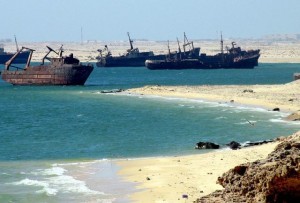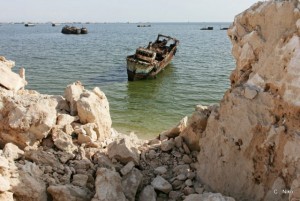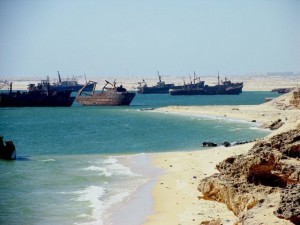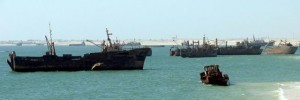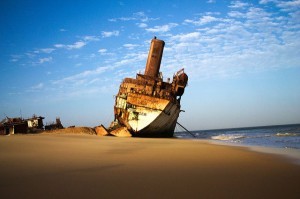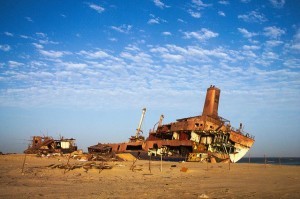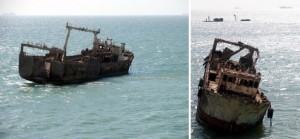Nouadhibou, originally named Port-Étienne by French merchants who settled there shortly before World War I, is the second largest city in Mauritania with nearly 100,000 residents and serves as a major commercial centre. It is situated on a 65-kilometre peninsula or headland called Ras Nouadhibou, Cap Blanc, or Cabo Blanco, of which the western side, with the city of La Güera, is part of Western Sahara. Mauritania gained independence from France in 1960 and the port city was renamed to its present name.
Because of the economic degradation coupled with a lack of jobs and income for the population, the government allows a large number of companies using the waters around the peninsula as the last stop for ships. Ships were brought from all over the world to be left in the shallow waters with a particular boom during the 1980’s. After nearly three decades of this practice, Nouadhibou’s coastline is a unique landscape of over 300 rotting ships and has become known for being one of the largest cemeteries of abandoned ships in the world.
(By the 1980s, the frequency with which abandoned ships were appearing in Nouadhibou’s bay increased dramatically)
Another reason for the rotting ships is that Mauritanians would purchase older ships from international shippers, hoping to run their own shipping business and compete. But the older ships were not economically competitive. Maintenance costs and repairs were too much to bear and when they went bankrupt the ships were abandoned.
(Financial hardships led to authorities turning a blind eye to ship owners who offered bribes to dump used vessels in the harbor)
(In Nouadhibou, enterprising businessmen could get anything done if they had the money)
(And while some are calling to clean up the wrecks, there are many positive side effects from the mass abandonment)
The graveyard is a large source of income for many inhabitants of Nouadhibou as well and local companies pay to salvage anything of value from the vessels. One of the two main advantages of the ship graveyard is the iron extraction of the ships. The second advantage is that the artificial “bays” and places surrounded by rotting hulls provide space for generation of various types of fish.
Although the abandoned vessels are a source of employment, it was expected that the sea rescue corporations will start cleaning the waters around the city. Carelessly discarded heavy metals, residues of various bodies polluted by oil products bays and waste of any kind are an everyday occurrence for people working in these areas. However, while there have been numerous proposals to help Mauritania clean up the ships, none have been fully realized.
Ask me anything
Explore related questions

